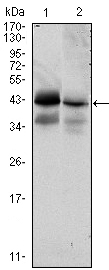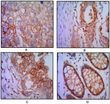EPCAM Mouse Monoclonal Antibody [Clone ID: 7E11]
Other products for "EPCAM"
Specifications
| Product Data | |
| Clone Name | 7E11 |
| Applications | ELISA, IHC, WB |
| Recommended Dilution | Western Blot: 1/500 - 1/2000. Immunohistochemistry on paraffin sections: 1/200 - 1/1000. ELISA: 1/10000. |
| Reactivities | Human |
| Host | Mouse |
| Isotype | IgG1 |
| Clonality | Monoclonal |
| Immunogen | Purified recombinant fragment of human EPCAM expressed in E. Coli. |
| Specificity | This antibody reacts to EPCAM. |
| Formulation | State: Ascites State: Ascitic fluid containing 0.03% sodium azide. |
| Conjugation | Unconjugated |
| Storage | Store the antibody undiluted at 2-8°C for one month or (in aliquots) at -20°C for longer. |
| Stability | Shelf life: one year from despatch. |
| Predicted Protein Size | 35 kDa |
| Gene Name | epithelial cell adhesion molecule |
| Database Link | |
| Background | This gene encodes a carcinoma-associated antigen and is a member of a family that includes at least two type I membrane proteins. This antigen is expressed on most normal epithelial cells and gastrointestinal carcinomas and functions as a homotypic calcium-independent cell adhesion molecule. The antigen is being used as a target for immunotherapy treatment of human carcinomas. Mutations in this gene result in congenital tufting enteropathy.Tissue specificity: This protein is expressed in almost all epithelial cell membranes but not on mesodermal or neural cell membranes. Found on the surface of adenocarcinomas.ABCAM:Epithelial Cell Adhesion Molecule (EpCAM) is a 40 kDa cell surface antigen. This antigen has been identified independently by a number of groups, and has been known by a variety of names. Several monoclonal antibodies have been raised against EpCAM, many of which have been described as tumour specific molecules on carcinomas. EpCAM is a Type 1 transmembrane glycoprotein. It is expressed on the basolateral membrane of cells by the majority of epithelial tissues, with the exception of adult squamous epithelium and some specific epithelial cell types including hepatocytes and gastric epithelial cells. EpCAM expression has been reported to be a possible marker of early malignancy, with expression being increased in tumour cells, and de novo expression being seen in dysplastic squamous epithelium.BIOLEGEND:This cell surface, glycosyl;ated 40kD protein is highly expressed in the bone marrow, colon, lung, and most normal epithelial cells and is expressed on carcinomas of gastrointestinal origin. |
| Synonyms | Ep-CAM, Epithelial cell adhesion molecule, GA733-2, EGP314, KSA, TROP1, Trop-1, M1S2, M4S1, MIC18 |
| Reference Data | |
Documents
| Product Manuals |
| FAQs |
| SDS |
{0} Product Review(s)
0 Product Review(s)
Submit review
Be the first one to submit a review
Product Citations
*Delivery time may vary from web posted schedule. Occasional delays may occur due to unforeseen
complexities in the preparation of your product. International customers may expect an additional 1-2 weeks
in shipping.






























































































































































































































































 Germany
Germany
 Japan
Japan
 United Kingdom
United Kingdom
 China
China




